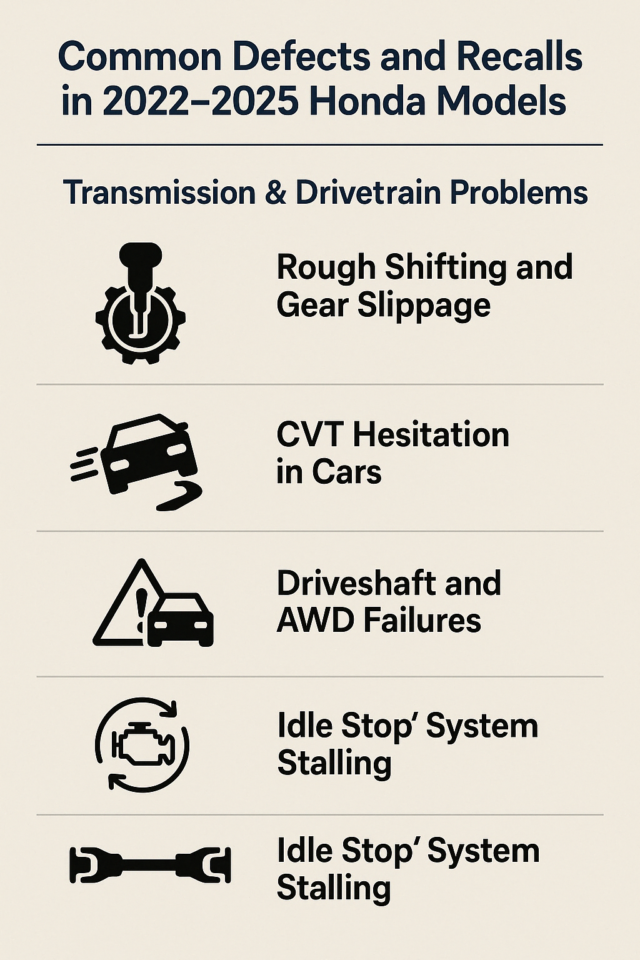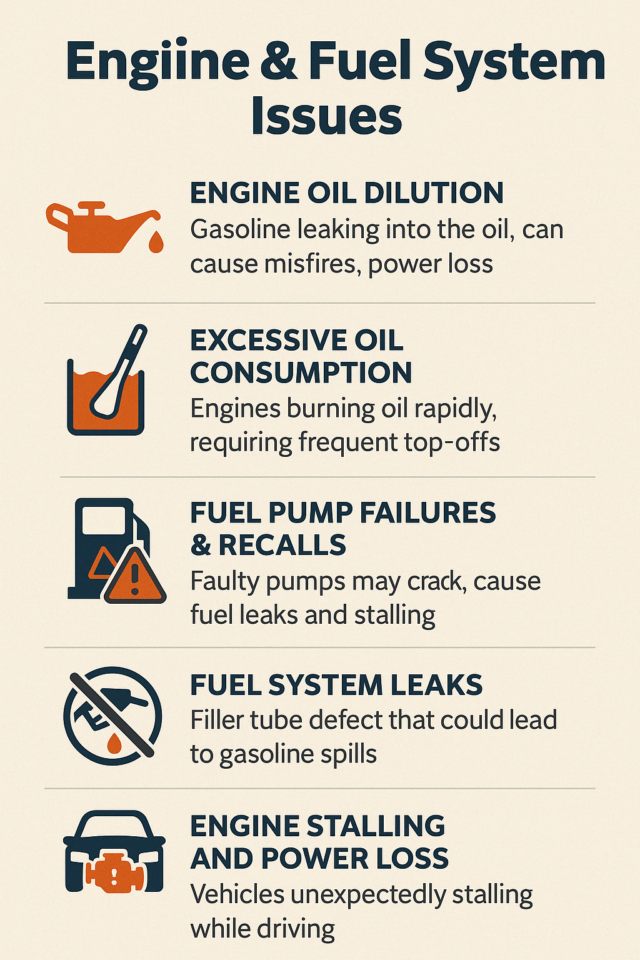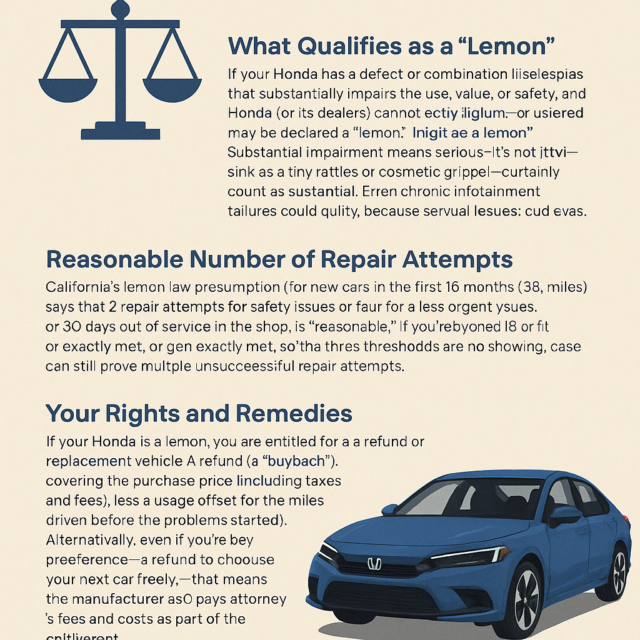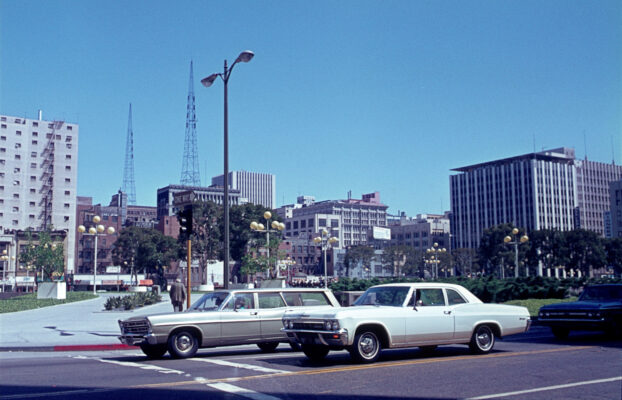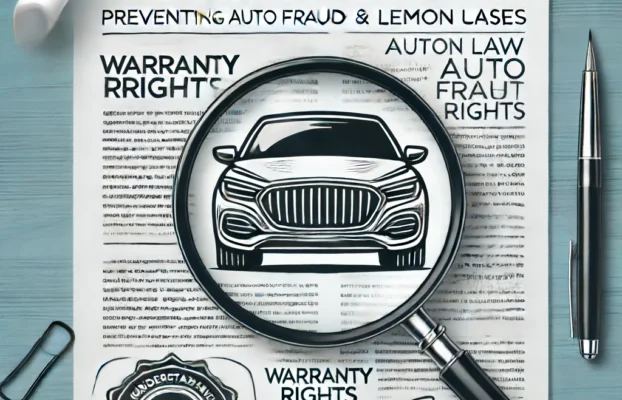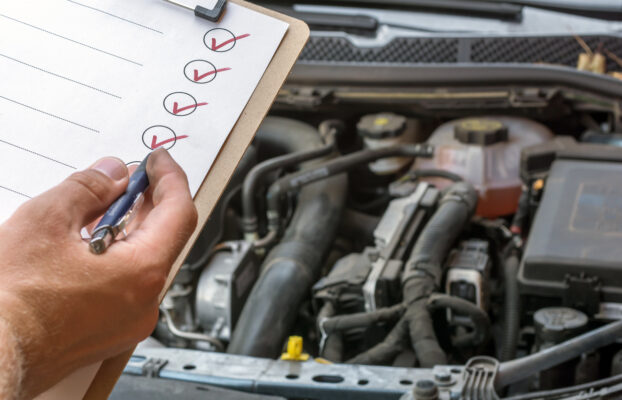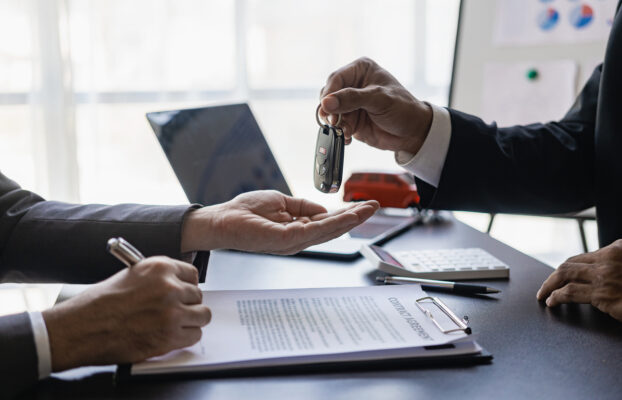What Does Honda Owe You For Your Lemon? 1. Down Payment refund 2. all monthly payments 3. rental and repair costs 4. full bank loan payoff 5. complete lease refund
Pay Us Nothing Even if We Win Your Honda Lemon Law Case.
Is Your New Honda a Lemon?
Did Your Honda Come With a Warranty?
Get Your Full Refund
Honda Lemon Law in California: 2022–Present Honda Defects and Recalls
Table of Contents
If you own a 2022 or newer Honda and are experiencing frequent problems, you’re not alone. In recent model years, Honda drivers across California have reported a range of defects – from transmission troubles to tech glitches. This detailed report breaks down common Honda vehicle issues (2022–present) and explains how California’s lemon law can help. We’ll cover known vehicle defects, recalls, class action lawsuits, and complaints affecting popular Honda models like the Civic, Accord, CR-V, Pilot, Odyssey, Ridgeline, Passport, HR-V and more. Our goal is to inform you in a clear, friendly way so you understand your rights and know when to reach out to a Honda lemon law lawyer. 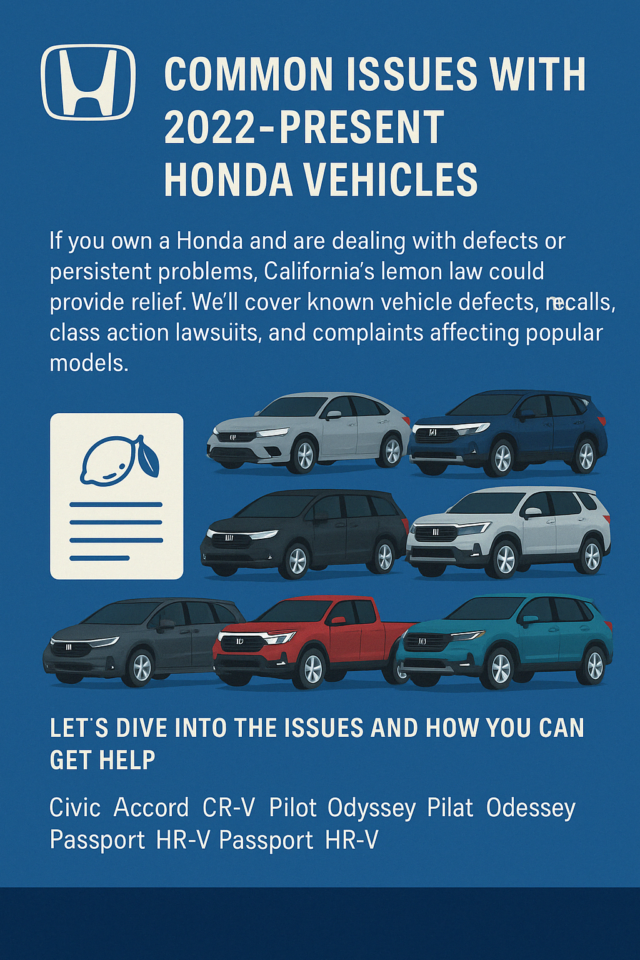
Let’s dive into the issues Honda owners have faced nationwide – especially here in California – and how you can get help if your Honda is a “lemon.”
Common Defects and Recalls in 2022–2025 Honda Models
Honda makes a variety of cars, trucks, and SUVs, and even reliable brands encounter defects. Below is an overview of major problems reported in 2022, 2023, 2024, and 2025 Honda models. These include mechanical troubles, safety system failures, and other defects that have led to recalls and legal claims. We’ve organized the information by category to make it easy to follow. Each issue can affect various Honda models:
Transmission & Drivetrain Problems
Rough Shifting and Gear Slippage: Many owners of larger Honda models (like the Pilot, Passport, and Ridgeline) have reported harsh or delayed shifting. The 9-speed automatic transmission used in earlier models was notorious for lurching between gears or hesitating. Even the newer 10-speed automatic (found in 2022+ Odyssey and 2023+ Pilot) can sometimes feel clunky. Drivers complain of gear “jerking” or the SUV stuttering during acceleration, which can be both frustrating and unsafe in traffic. Honda has issued software updates and service bulletins to address some shifting issues, but if your transmission continues to act up
after multiple repair attempts, it might be a lemon law situation.

CVT Hesitation in Cars: Smaller Honda cars like the Civic, Accord, and HR-V use CVT (continuously variable) transmissions. These CVTs generally boost fuel economy, but some owners have experienced shuddering, slipping, or hesitation during acceleration. For instance, a Civic or Accord might rev the engine but fail to deliver power smoothly to the wheels – a scary feeling if you’re merging onto a California freeway. While not every Honda CVT has problems, consistent transmission malfunctions in a new vehicle are not normal. Any repeated failure of the CVT to operate properly (after Honda has tried to fix it) could make your Honda qualify as defective under lemon law.
Driveshaft and AWD Failures: Honda’s drivetrain (the system that delivers power to the wheels) has had a few specific defects. A notable example is a recall of 2022 Honda CR-V Hybrid models for front driveshaft failure. In that recall, an improperly heat-treated driveshaft component could crack or break, causing a sudden loss of power or even allowing the car to roll when parked. Honda’s dealers have been replacing those faulty shafts. All-wheel-drive Honda SUVs (like certain CR-Vs or Passports) have also had occasional issues with rear differentials and driveshaft U-joints. If you hear clunking noises or experience power loss to the wheels that the dealer can’t seem to fix, it’s a serious defect.
“Idle Stop” System Stalling: Many newer Hondas come with an Auto Idle-Stop feature (to save fuel, the engine turns off when you stop at lights). Unfortunately, in models like the Pilot, Passport, Odyssey, and Ridgeline (2016–2023), this system has a known defect: sometimes the engine won’t restart when you lift your foot off the brake. Imagine sitting at a Fresno intersection and your SUV just stays dead when the light turns green – that’s what some drivers have faced. This issue has prompted numerous complaints and even class action lawsuits claiming the Idle-Stop feature is defective. Honda has not issued a full recall for it yet (as of this writing), but they have acknowledged the problem. If your Honda frequently fails to restart after auto stop and the dealer can’t resolve it, you could have a strong lemon law claim for a stalling engine.
Engine & Fuel System Issues
Engine Oil Dilution (1.5L Turbo Issues): Honda’s popular 1.5-liter turbocharged engine (found in many 2017–2023 CR-Vs, Civics, and Accords) has faced complaints of oil dilution. This means gasoline leaks into the engine oil, which can lead to engine misfires, power loss, or long-term engine damage. Honda did software updates to address this in earlier years, and by 2022 it’s reportedly improved, but some owners still report a strong gas smell in the oil or rising oil levels. If your Honda’s engine runs rough, loses power, or the oil is mysteriously overfilled with fuel, it’s a known issue. Left unfixed, oil dilution can cause serious engine wear.

Excessive Oil Consumption: Separate from dilution, a few Honda owners have noted their vehicles burning oil too quickly. This has been more common in older V6 engines, but if you have to constantly add oil to a new 2022+ Honda between scheduled changes, something is wrong. An engine that consumes oil or blows blue smoke might have defective piston rings or valve seals. It’s worth documenting and having the dealer address it under warranty. Repeated excessive oil consumption repairs that fail can justify a lemon law claim, since the engine’s health is vital.
Fuel Pump Failures and Recalls: One of the biggest recent Honda recalls (late 2024) involved over 700,000 vehicles for a defective fuel pump. Certain 2023–2024 Accord (and Accord Hybrid), 2023–2025 CR-V Hybrid, and 2025 Civic (including Civic Hybrid) models have high-pressure fuel pumps that can crack, potentially causing fuel leaks and engine stalling. A fuel leak raises the risk of fire, so this recall was crucial. Owners of these models are advised to get the fuel pump inspected or replaced by Honda. If you drive one of these and smell gas or experience sudden stalling, get it checked immediately – it’s a known defect. Even outside this recall, a failing fuel pump or fuel injectors in a new Honda (leading to loss of power or stalling) should be taken very seriously.
Fuel System Leaks (Filler Tube Defect): In late 2023, Honda also recalled about 200,000 SUVs (2023–2024 Passport and 2023–2025 Pilot) because the fuel filler neck pipe could detach in a crash, potentially causing gasoline to spill. While this issue would typically occur during an accident (when the filler neck might separate due to a missing piece of hardware), it’s still worth noting. It means those models had an assembly glitch. In everyday use, most drivers won’t notice anything – but if your Honda smells like gasoline or has any leak near the tank area, it’s not normal. Always address fuel odors or leaks immediately for safety. Fuel system defects that persist are exactly the kind of serious issues lemon laws cover.
Engine Stalling and Power Loss: Beyond fuel pumps, there have been sporadic reports of engine stalling in various Honda models. For example, some Honda Accord and CR-V owners have experienced the car shutting off while driving or at idle, even without the idle-stop engaged. This could stem from anything – a faulty crankshaft sensor, bad fuel delivery, or software bugs. One recall in past years addressed a crankshaft manufacturing defect in older models that could lead to stalling (thankfully, corrected before 2022). But if your 2022+ Honda’s engine dies on you unpredictably and the service center can’t permanently fix it, that’s a major defect. Document each repair attempt because repeated stall issues are dangerous and meet the “substantial impairment” standard for lemon law.
Electrical & Infotainment Glitches
Infotainment System Failures: Modern Hondas are packed with touchscreens, Bluetooth, and navigation – great when they work, frustrating when they don’t. Infotainment issues have been a headache for many Honda owners. In fact, Honda faced a class action lawsuit for the 2018–2019 Odyssey, Pilot, and Passport for screens that would freeze, reboot, or go dark randomly. That led to a settlement to improve those systems. In the 2022–2025 models, the infotainment systems are updated, but some glitches persist. Common complaints include the audio system cutting out, the backup camera freezing or displaying a blank screen, Bluetooth calls dropping, or the entire head unit rebooting while driving. For example, a 2022 Odyssey owner might find the rear entertainment or touchscreen unresponsive until the car is restarted. Or a 2023 Accord driver with the new Google-based system might experience app crashes. If you’ve had your Honda in the shop multiple times because the infotainment or navigation won’t work properly, you’re dealing with more than just annoyance – it’s a warranty issue that could qualify as a lemon if it significantly affects your use of the vehicle (think: no rear camera or no radio on a long commute can be quite impactful).
Honda Sensing and Electrical Gremlins: Honda Sensing is the suite of driver aids (adaptive cruise control, lane keeping assist, collision mitigation braking, etc.). It relies on cameras, radar, and software. Some owners have encountered what we call “electrical gremlins” with these systems. False collision warnings or “phantom braking” is one example – the car’s automatic emergency braking slams the brakes or flashes “BRAKE!” when nothing is in front of you. This has been reported in some CR-V, Accord, and Civic models with adaptive cruise, and it can be frightening. While no widespread recall has been issued for phantom braking in Hondas, NHTSA has investigated similar issues in competitor vehicles, and Honda owners have filed complaints. Other electrical issues include malfunctioning sensors (e.g., radar or camera needing frequent recalibration) and check-engine or check-safety lights coming on with no clear cause. If your Honda’s dash is lit up like a Christmas tree or it’s braking by itself, it absolutely warrants a dealer visit – and if it keeps happening, it strengthens a lemon law case (safety feature malfunctions are serious defects).
Battery Drain and Electrical System Faults: A car that won’t start is incredibly frustrating, especially if it’s brand new. Some Honda models have had battery drain problems, where the 12-volt battery dies overnight or the alternator isn’t charging properly. Past Odysseys and Pilots had issues with parasitic drains (like interior lights or modules not going to “sleep”). By 2022, Honda improved many of these, but if you have a 2022–2025 Honda that repeatedly has a dead battery, something’s wrong electrically. There was also a recall in late 2023 on the CR-V Hybrid (2020–2022) because the 12-volt battery cable in those hybrids was routed without a proper fuse, which could short out in a crash. That’s more of a crash-safety recall, but it shows Honda’s electrical design had a flaw. Separately, some new Accord and Civic owners have reported random electrical issues like power windows not working, doors unlocking themselves, or error messages about charging systems. Modern cars are complex, but you shouldn’t be dealing with constant electrical quirks in a new Honda. Recurrent electrical failures that the dealer can’t fix (after reasonable attempts) fall under lemon law protection.
Lighting and Accessory Issues: It’s worth mentioning smaller electrical components too. There have been instances of LED headlights or taillights failing prematurely on some newer Hondas. Also, features like power sliding doors on the Odyssey or the hands-free tailgate on a CR-V can malfunction if their sensors or wiring are defective. While a broken power tailgate is not as life-threatening as engine or brake issues, it still affects the use of your minivan or SUV. Under California’s lemon law, any defect that “substantially impairs the use, value, or safety” of the vehicle can qualify – and not being able to use a core feature you paid for (like those fancy automatic doors) might meet that threshold if Honda cannot repair it after multiple tries.
Hybrid System & Battery Concerns
Hybrid Battery Performance Problems: Honda’s hybrid models (Accord Hybrid, CR-V Hybrid, Insight, and the new Civic Hybrid) use high-voltage battery packs to store energy. These battery packs are designed to last the life of the car, but there have been occasional issues. Some hybrid owners have reported warning lights for the hybrid system, reduced fuel efficiency, or the car switching to gas-engine only due to battery faults. For example, a 2022 Accord Hybrid might show a “Check Hybrid System” error if there’s a bad cell in the battery pack or a software glitch. In rare cases, a hybrid battery may fail outright at a young age, leading to significantly reduced performance or the inability to drive in EV mode. Honda generally replaces defective hybrid batteries under warranty (they’re usually covered for at least 8 years/100,000 miles in California). However, if your hybrid repeatedly suffers battery or electric motor issues that the dealer can’t sort out, it’s not normal. Hybrid components are expensive – repeated failure indicates you might have a lemon on your hands.
Charging System and Regeneration Issues: Hybrids and electric vehicles have complex charging systems. While Honda hasn’t had a full electric car in 2022–2024 (the Honda Prologue EV is coming in 2024/2025), the hybrids have regeneration (charging the battery when braking) and sophisticated electronics. Problems can occur with components like the DC-DC converter (which is like an alternator for the hybrid, maintaining the 12V battery), or the power control unit. If those go bad, you might see an array of dash lights or experience the car not restarting after shutting off. There was a known issue in some older Honda Insights where a bad DC-DC converter caused the car to stall – not something we expect in the latest models, but a reminder that hybrid issues can straddle the line between electrical and engine problems. If your hybrid Honda is frequently in the shop for any kind of battery, charging, or electric drive malfunction, keep records. The lemon law applies equally to hybrids: your vehicle is expected to operate reliably just like any traditional car.
Lack of Power or EV Mode Failures: One thing hybrid drivers might notice is if the car isn’t using its electric motor assist as it should. Say you have a CR-V Hybrid and it’s supposed to seamlessly switch between electric-only driving at low speeds and use the motor to boost acceleration. If a defect is present, the car might struggle, feel underpowered, or the engine revs high constantly because the hybrid synergy isn’t working. Software updates can fix some of these glitches, but persistent failure could indicate a faulty battery module or control unit. Honda did recall some older hybrids for such issues, but for 2022+ keep an eye out. Bottom line: any recurring hybrid-system fault in a new Honda is abnormal. These are exactly the sorts of problems California lemon law is designed to address, because an underperforming hybrid not only affects drivability but also fuel economy (a key reason you bought the hybrid).
Safety System & Equipment Defects
Steering Problems (Sticky Steering Recall): A critical safety defect discovered in 2024 was an issue with steering gearboxes in many newer Hondas. Honda ended up recalling close to 1.7 million vehicles (2022–2025 models) – including certain Honda Civic, CR-V, HR-V, and Acura Integra – because the power steering rack assemblies were manufactured incorrectly. The defect causes excessive friction in the steering, which can make the steering wheel suddenly hard to turn or “stick” straight while driving. You can imagine how dangerous that is, especially at highway speeds or on curvy roads. The National Highway Traffic Safety Administration (NHTSA) opened an investigation after numerous Civic owners complained of sticky steering. If you drive a late-model Civic or HR-V and notice the steering wheel isn’t responding smoothly or you have to fight to turn it, get it checked immediately – this is a known issue. Under the recall, Honda dealers will replace parts in the steering system for free. But if you had this problem and they didn’t fix it properly after repeated tries (or if it caused a scare or incident), that’s something a Honda lemon law attorney would definitely want to hear about.
Airbag Sensor Defects: Even as Honda was putting the massive Takata airbag recall behind them (that affected older cars), a new airbag issue cropped up for recent models. In early 2024, Honda recalled about 750,000 vehicles (2020–2022 model years) – including the Honda Civic, Accord, CR-V, HR-V, Odyssey, Pilot, Passport, Ridgeline, and some Acura models – because of a faulty occupant detection sensor in the front passenger seat. The defect: the sensor’s circuit board could crack in humid conditions, misidentifying whether a passenger is small or large. This could lead to the airbag deploying when it shouldn’t – for example, deploying with a child in the front seat, which can cause injury – or not deploying properly when it should. No injuries were reported before the recall, but Honda took action to replace those seat weight sensors. If your Honda had issues with the airbag light or the passenger airbag “off” indicator acting funny, it might be related. Any airbag malfunction is a serious safety concern. While the recall addresses it, if your vehicle’s airbag system isn’t fixed after multiple attempts, you should not have to just live with that risk – lemon law would support you in getting a replacement vehicle or refund.
Seat Belt Failures: Seat belts are the first line of safety, and Honda has had a couple of seat belt-related recalls recently. In 2023, Honda recalled approximately 300,000 of its 2023–2024 Accord and HR-V models because front seat belt pretensioners were missing a critical rivet. Without this rivet, the pretensioner (which locks the belt in a crash) might not hold, increasing injury risk in an accident. Fortunately, Honda reported no injuries before catching this assembly mistake, and dealers are replacing those components. Another recall (late 2021) affected some 2022 Honda Insight and CR-V Hybrid, plus 2021 Accord and CR-V units, where the rear center seat belt retractor could improperly deactivate, meaning a child seat might not be secured correctly. If you’ve experienced any seat belt that won’t latch, that frays, or that doesn’t lock during sudden stops, that is a defect. We’ve also seen older CR-V models (2017-2020) with front seat belt latch issues due to heat – something for owners of slightly older Hondas to check. In any case, seat belt defects are taken very seriously under the law. These are exactly the kinds of “substantial safety impairment” that lemon law covers if not corrected quickly.
Braking System and ABS Issues: Honda’s braking systems are generally reliable, but a few complaints have emerged. Some Passport and Pilot owners have reported instances of the vehicle braking on its own during turns or the Collision Mitigation Braking System activating incorrectly (as mentioned under phantom braking). Additionally, any ABS (anti-lock brake) or brake booster problems can be dangerous – for example, a brake pedal that feels soft or goes to the floor in a new car is not normal. There haven’t been major brake recalls on 2022+ Hondas (aside from the electronic glitches), but if your Honda has poor braking performance or warning lights for ABS/VSA that the dealer can’t resolve, don’t ignore it. It could indicate a manufacturing defect in the brake master cylinder, a bad sensor, or even contamination in the brake lines. Brakes are obviously a top safety priority, and repeated brake failures or repairs would likely qualify a vehicle for lemon law relief.
Other Equipment Recalls: There are always a few miscellaneous issues. For instance, in 2023 Honda also had a recall for side-view mirrors on over 330,000 vehicles (including recent Odyssey, Passport, Pilot, and Ridgeline models). The mirror’s heating pad adhesive could fail, causing the mirror glass to literally fall out – not something you want while driving! Another example: some owners have reported issues with door latches or tailgate struts (a tailgate that won’t stay open or doors that refuse to lock properly). While these may seem minor, they affect the value and use of your vehicle – imagine not being able to use the trunk of your new CR-V because it keeps slamming shut, or worrying your door might fly open. California law doesn’t require the defect to be life-threatening; it just needs to significantly impact your use or the car’s value. So don’t discount these “smaller” issues if they’re persistent. Keep track of any recall notices you receive, and don’t hesitate to get all defects repaired.
California Lemon Law and Your Honda
California has one of the strongest lemon laws in the country to protect consumers. The Song-Beverly Consumer Warranty Act, our state’s lemon law, applies to new (and certain used) vehicles purchased or leased in California that have a warranty. Here’s how it works for a defective Honda:
What Qualifies as a “Lemon”: If your Honda has a defect or combination of issues that substantially impairs the use, value, or safety of the vehicle, and Honda (or its dealers) cannot fix those issues after a reasonable number of repair attempts, the vehicle may be declared a “lemon.” “Substantial impairment” means the problem is serious – it’s not just a tiny rattle or a cosmetic gripe. The issues we outlined above (engine troubles, transmission failures, safety system glitches) certainly count as substantial. Even chronic infotainment failures could qualify, because they affect the value and functionality of a modern car.
Reasonable Number of Repair Attempts: California’s lemon law presumption (for new cars in the first 18 months or 18,000 miles) says that 2 repair attempts for a safety issue (like brakes or airbags), or 4 attempts for a less urgent issue, or 30 days out of service in the shop, is “reasonable.” If you hit those numbers and the car still isn’t fixed, it’s presumed to be a lemon. However, even if you’re beyond 18 months or don’t exactly meet those thresholds, don’t be discouraged – you can still prove your case by showing they’ve tried multiple times without success. For example, maybe your Civic’s steering has been looked at 3 times over two years and still sticks – that’s very much something the law covers, presumption or not.
Your Rights and Remedies: If your Honda is a lemon, you are entitled to a refund or replacement vehicle. In a refund (a “buyback”), the manufacturer must pay you back the purchase price (including taxes and fees), minus a usage offset for the miles you happily drove before the problems started. If you owe money on a car loan, they’ll pay that off. Alternatively, you can opt for a replacement – Honda would provide a new, comparable vehicle – though many clients prefer a refund to choose their next car freely. Importantly, the manufacturer also pays your attorney’s fees and costs if you win a lemon law case. That means hiring a lemon law attorney should not add financial burden to you – Honda will foot that bill as part of the settlement.

Used Cars and Lemon Law: What if you bought a used 2022 Honda? If it was sold with a Honda factory warranty or as a Certified Pre-Owned, you can still have lemon law protection. The defects just need to have shown up and been reported while under the warranty period. So a 2022 Honda with a 3-year warranty, bought used in 2023, still qualifies if it has persistent defects. Just be sure to give the dealer a chance to fix it (take it in for warranty repairs and keep those work orders).
Keep Good Records: To take advantage of the lemon law, documentation is key. Save all repair orders, receipts, and communication with Honda service centers. Make note of each time you brought the car in, what you complained about, and how long it was in the shop. These records will show the pattern of unresolved problems. Also, if you get any recall notices, keep those – they are proof the manufacturer acknowledged a defect (even if it’s not exactly your issue, it helps paint the picture). California law doesn’t require you to notify the manufacturer formally that you’re invoking lemon law before contacting a lawyer, but it sometimes helps to directly let Honda know you’re experiencing ongoing issues. Often, cases can be settled out of court when the evidence is clear that the car is defective.
Don’t Delay Seeking Help: There are time limits (deadlines called “statutes of limitation”) to file a lemon law claim, so it’s wise to act sooner rather than later. Additionally, the longer you endure a faulty car, the more hassle and potential danger you face. California consumers have strong rights, but you have to exercise them. If you suspect your Honda is a lemon, even if you’re not 100% sure, consulting a lemon law attorney can clarify your next steps. Remember, you bought your Honda with the expectation of reliability and safety – the law simply holds Honda accountable to live up to their warranty promises.
How Sierra Litigation Can Help Honda Owners
Dealing with a defective car can be overwhelming, but you don’t have to go through it alone. Sierra Litigation is here to help Honda owners across California – including Fresno, Los Angeles, San Diego, Sacramento, San Francisco and beyond – get the justice and compensation they deserve under the lemon law. Our firm specializes in representing consumers with lemon vehicles, and we have extensive experience with Honda lemon law cases in particular.
Here’s how we can assist you with your Honda lemon:
Expert Lemon Law Attorneys: Our team knows California’s lemon law inside and out. We stay up-to-date on the latest Honda recalls, technical service bulletins, and common defects. Whether you’re dealing with a Honda Civic with persistent steering issues or an Accord with endless electrical problems, we understand the technical and legal aspects of the case. We’ve handled cases involving transmission failures, engine defects, faulty safety systems – you name it. Having a knowledgeable Honda lemon law lawyer on your side means you’ll have someone who can quickly identify if your situation qualifies and how to pursue it.
Free Consultation and Case Review: Not sure if your case is a “lemon”? No problem – we offer a free initial consultation. We’ll listen to what’s been happening with your Honda (every repair visit, every weird symptom). We’ll help evaluate if it likely meets the lemon law criteria. There’s no obligation and no cost to you for this case review. We know it’s important for you to understand your options without pressure.
No Out-of-Pocket Legal Fees: If we take your case, we work on a contingency fee basis as allowed under the lemon law. Simply put, you won’t pay us out of pocket. If we win or settle the case, Honda (the manufacturer) pays our attorney fees and costs on top of making things right for your vehicle. This aligns our interests – we’re motivated to win your case and get you the maximum compensation, because that’s how we get paid too. And if for some reason we don’t succeed (though we pride ourselves on a strong success rate), you wouldn’t owe attorney fees. We take the risk so you don’t have to.
Personalized Service in California Cities: Sierra Litigation may be based in the Fresno area, but we handle cases throughout California. We’ve helped clients in the Central Valley, the Bay Area, Southern California – from San Francisco to Los Angeles to San Diego. Our attorneys can coordinate repairs and gather evidence with your local Honda dealerships no matter where you are. We’re familiar with the dealerships in these regions and have likely dealt with the same service managers or Honda corporate representatives before. When you work with us, you get big-firm lemon law expertise with the personal touch of a local practice. We know California consumers and we fight for our neighbors’ rights.
Aggressive Advocacy, Quick Resolution: Once we establish that your Honda qualifies as a lemon, we handle all communications with Honda’s legal team or settlement department. You won’t have to argue with the dealership or Honda anymore – we take on that burden. Our attorneys will prepare a strong claim on your behalf, often including a detailed timeline of repairs, expert mechanic opinions if needed, and relevant technical evidence (for example, showing that your issue aligns with known recalls or complaints). We aim to resolve cases efficiently, often through a settlement where Honda agrees to buy back your car or provide a fair replacement plus cover your costs. Most lemon law cases don’t go to trial, but we are fully prepared to litigate in court if needed. Honda has a duty to you under the law, and we make sure they honor it.
Guidance on Next Steps: Beyond the legal process, we know this is about getting you back on the road in a reliable vehicle. We’ll advise you on how to handle your current car in the meantime (for instance, continue taking it in for repairs – it helps your case and ensures safety). If a buyback is achieved, we guide you through returning the car and getting your refund check. Our goal is to make the entire process stress-free for you. We handle the paperwork and legal strategy; you focus on planning your next move – maybe picking out a new car that actually works as promised.
Don’t suffer in silence with a defective Honda. California law is on your side, and Sierra Litigation is ready to enforce it for you. Whether it’s the family Honda Odyssey that keeps breaking down or your new Honda CR-V that’s stuck at the dealer every other week, we understand your frustration. Our friendly, slightly conversational approach means we’ll talk to you like a real person, not just a case number. And our persuasive, results-driven representation means Honda will take your claim seriously.
Take Action Today
If you suspect your Honda is a lemon, reach out to us today. The sooner you act, the sooner we can get you a refund, replacement, or cash settlement and get you out of that unreliable vehicle. Contact Sierra Litigation for a free case evaluation with a Honda lemon law attorney. We’ll explain your rights in plain English (no legal jargon or confusing terms) and outline a game plan. Remember, you paid good money for your Honda and you deserve a safe, working car. If Honda couldn’t fix it after giving them a fair chance, then you have the right to demand a remedy.

Sierra Litigation has helped countless California drivers turn their “sour” car experience into a sweet victory under the lemon law. Let us help you next. Your Honda problems could soon be resolved – and you could be driving with confidence again, with our legal team in your corner.
Disclaimer: This report is for informational purposes and not legal advice. Every case is unique. For specific advice on your situation, please contact our attorneys for a consultation.
Start Your Free Honda Lemon Law Consult Today
We serve All of California:
Give Us a Call 24 hours a day:
Office Hours:
Gain Insights About the Legal Landscape For Automobile Manufacturer Lemon Law Claims in California
See What our great clients wrote about us.

Attorney John Miser and Raquel at Sierra Litigation exude professionalism, responsiveness, and are very knowledgeable. They were incredibly helpful and answered all of my questions as soon as I called. They took the time to reiterate things I did not understand and allowed me to time to process the information I was receiving. It was very refreshing to speak to a firm that cares about their clients.

I called John for a consultation- which he did over the phone - and he was the most helpful attorney I talked to all day. I had called through 15 different offices-none of which gave me more than one minute of their time, literally- before I reached Sierra Litigation. John was by far the friendliest and he didn't rush me off the phone. He provided succinct responses to help me through my issue and answered follow up questions. If I am ever in need of further representation I'm going to John. I dont care the cost - he's worth every penny compared to other offices.

My family and I are extremely grateful that we found John Miser. While calling multiple consumer fraud attorneys in the Central Valley, John Miser was the only one who responded and also responded within the hour. He has been an excellent attorney from day 1 assisting us in consumer fraud, and going above and beyond my expectations and won our case. I will definitely refer John Miser to any friends or family ever in need of his assistance. Thank you John.

John is in the middle of a battle with lowes and pergo on my behalf and I couldn't be more pleased with his tenacity, insight and strategy. Although we are early in the settlement negotiations he has already proven himself beyond all expectations. I really appreciate the fact that he is guided by principles and although this started out as a simple and relatively small warranty denial claim, he was able to uncover other violations they had done, which triggered a righteous indignation of what is likely a larger pattern of misleading consumers by lowes and pergo. Honestly in talking to john I get the sense that he gives the same attention to a $5k case as a $5 million dollar case. brilliant, honest and humble aren't strong enough words to describe John and his lawfirm. If you are dealing with a consumer protection issue or personal injury and are wondering who to call, try sierra litigation and if you are lucky enough to reach him when he is taking on new clients you will be pleased.
John has done a fantastic job with my case regarding auto fraud by a dealer. He took a case that no one wanted not for the lack of merit but because of the difficulty of it. John work tirelessly to ensure an amazing out come and took this case all the way thru arbitration to win, and get a very strong win at that! I couldn’t thank John enough for his hard work, perseverance, and willingness to take a tough case.

John is incredible. He helped me understand so much better the importance of vehicle contracts and reading them before giving a signature. He went out of his way to give me the best advice he could while being in such a terrible situation. He is very honest and went out of his way to help me even though I am not even a client! Thank you!!

So I had contacted John regarding a business related issue I was involved with, with this being my first time ever dealing with something like this, let me tell you first hand, he’s honest, upfront, very informative, and key thing, explains in detail and provides foresight. I went in to see him with my issue I had and I’ve been stressed for about a few weeks regarding my issue, I explained to him my case, afterwards I was so relieved, he provided all the different variables and approaches in my matter, it gave me a sense of guidance on what I can do and should do. I was very comfortable speaking with him, gave me a sense of relief after my meeting with him, all I can say is call him and meet with him and you will feel so much better because he really understands legal matters and understands how to help you with your case and also breaks it down for you to understand and how to go forth. Thanks John!

Hello Everyone To be honest I do not usually write reviews like this but in this case I want to share my experience with Sierra Litigation. The attorneys are John Miser and Raquel Chavez. In my opinion, both are excellent attorneys. In my case, I work mainly with Raquel Chavez. We just settled the lawsuit stemming from automobile fraud. The case took a little over two years to settle. Miss Chavez stayed on top of the case for the whole time. Any time I called to see how things were going. They were very friendly, gave me the details of how the case was going and where we go from there.They truly sounded like they were happy to hear from me. It was a pleasure working with Miss Chavez and Mr. Miser. I probably called six or eight attorneys. Most of them didn't even return my calls. The rest basically said they weren't interested in taking my case. When I called Sierra, I left a message and they called me back within five minutes. I told Mr. Miser the facts of my case and what was going on and he told me that I had a case. He was happy to help me out. I had never needed an attorney before, and I had never sued anybody before. Miss Chavez kept me informed and took the time to explain what was going on. They never rushed me off the phone and answered some of my phone was probably to them silly questions. If you're ever need an attorney, then I highly recommend both Miss Chavez and Mr. Meister. If I ever need a lawyer again and they will be the first ones I call.
